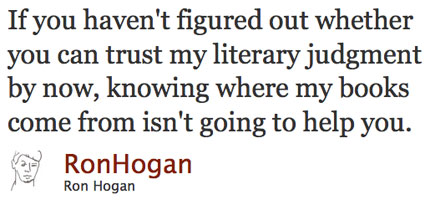New Yorker Taps a New Generation of Faves
 The New Yorker announced the roster of its new list of “20 Under 40” fiction writers of particular esteem, and The New York Times got the scoop:
The New Yorker announced the roster of its new list of “20 Under 40” fiction writers of particular esteem, and The New York Times got the scoop:
“They are Chimamanda Ngozi Adichie, 32; Chris Adrian, 39; Daniel Alarcón, 33; David Bezmozgis, 37; Sarah Shun-lien Bynum, 38; Joshua Ferris, 35; Jonathan Safran Foer, 33; Nell Freudenberger, 35; Rivka Galchen, 34; Nicole Krauss, 35; Yiyun Li, 37; Dinaw Mengestu, 31; Philipp Meyer, 36; C. E. Morgan, 33; Téa Obreht, 24; Z Z Packer, 37; Karen Russell, 28; Salvatore Scibona, 35; Gary Shteyngart, 37; and Wells Tower, 37.”
There are some great writers on this list—I’m already a fan of at least five of them—and of course we all have our ideas about who ought to be on this list and isn’t: I would’ve been delighted to see Cory Doctorow, or Megan Abbott, or Lauren Van den Burg, or Ron Currie, Jr., but that’s the sort of debate that makes these lists an entertaining parlor game, no more meaningful (or meaningless) than trying to put together your fantasy baseball team. Rather than the last word, this should be a conversational jumping-off point, an opportunity for all of us who love great writing to share our favorites with each other and make new discoveries.
I will say, however, that I found the Times‘ choice of headline—”20 Young Writers Earn the Envy of Many Others”—profoundly disappointing; it may well be the case in the days to come, but I think it’s a rather shabby sentiment to launch the list with, although it may tell us much about the ways in which the Times views the contemporary literary scene.
Robert Crumb’s parody of New Yorker icon Eustace Tilley from a 1994 cover
2 June 2010 | uncategorized |
Disclosure, Transparency, Legitimacy: Background Links

Here are links to some old GalleyCat posts that expand upon the context of some of what I was getting at in my Book Blogger Con presentation:
Last October, the Federal Trade Commission introduced a set of new guidelines on when bloggers should disclose the receipt of consumer goods, guidelines I viewed as too restrictive because they served to delegitimize online media. I also had serious misgivings about federal regulation of editorial content—misgivings that were shared by enough other people that the FTC eventually clarified that they were only trying to regulate a certain kind of blog, and hadn’t intended to round up all blogs in their regulatory lasso.
The FTC’s initial stance, however, did raise important questions about who gets to be a legitimate book reviewer, questions I’ve been dealing with for years, because insecure book reviewers have a habit of attacking bloggers and refusing to give them respect.
31 May 2010 | uncategorized |

 Our Endless and Proper Work is my new book with Belt Publishing about starting (and sticking to) a productive writing practice.
Our Endless and Proper Work is my new book with Belt Publishing about starting (and sticking to) a productive writing practice. 
